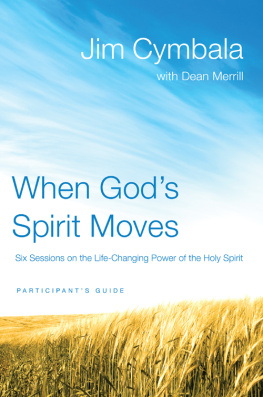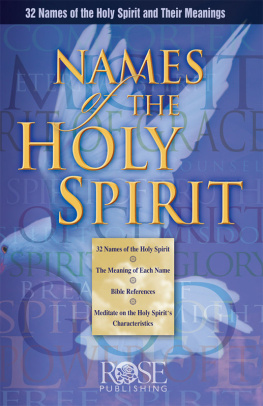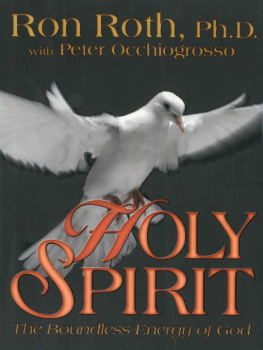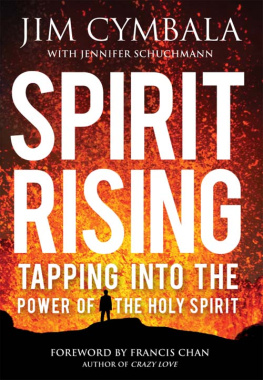Introduction
I n the last one hundred years, the Holy Spirit received a much-needed revival in interest from theologians who delineated his role in such diverse areas as salvation, sanctification, ecology, ecclesiology, eschatology, and ethics. There is, however, a widely neglected aspect of the Spirits work: judgment. Is this neglect due to a lack of interest in the doctrine of judgment, or perhaps to an unwillingness to discuss and debate the Spirits condemnatorial work? While there has been an increased interest in final judgment among evangelicals recently, this interest has revolved around the narrow issues of annihilationism and universalism. There has not been a widespread discussion about the nature of Gods judgment under either category; instead, both issues have focused their attention on the duration of punishment.
In conjunction with a lack of interest in the doctrine of judgment, many people picture the Spirit as the Comforter, with comforter conjuring up images of being reassured during hard times or consoled during distress. Unfortunately, the original meaning of the word comforter has been lost. The translation of Paraclete as Comforter derives originally from Wycliffe and was subsequently adopted by the KJV, thus bringing it into the use we see today. The meaning of comforter in the time of Wycliffe and King James, however, does not align well with the modern usage of the term. Comforter for most people denotes someone or something that makes the best out of a difficult situation or that offers consolation. A comforter is a warm blanket on a cold night used to make someone feel better. The derivation of the word comforter from its Latin root would imply someone who is strong ( forte) with ( con) someone. The use of the word comforter to describe the Holy Spirit has contributed greatly to a perception of the Spirit as being uninvolved in the harsher aspects of Gods nature. The misconception of the Holy Spirit as a security blanket needs correction, for while the Spirit most definitely offers security and comfort he also manifests Gods awesome presence; a presence that caused Israel to tremble in fear at the base of Mount Sinai and Isaiah to tremble at the knowledge of his own sinfulness.
The Spirit is Gods empowering presence within creation and his work is the expression and execution of what the three of them (Father, Son, and Holy Spirit) have planned together. All of these theologians share the common deficiency of ascribing the actualizing of Gods work to the Spirit, while failing to follow through consistently on this assertion by explicating his role in judgment.
Grenz comes close when he argues that hell is the dark side of Gods love, but he never makes the explicit statement that the unredeemed encounter the dark side of Gods love, his wrath, in the Spirit. He writes, Those who reject Gods reconciling love in this life must know that love as wrath in eternity. The depersonalizing of Gods love in reference to wrath is incompatible with the personalizing of his love in the Spirit regarding eschatological glorification. As unfamiliar as it might be, we should neither depersonalize, nor neglect the dark side of the Spirit.
While it is widely accepted that the Holy Spirit actualizes the redemptive work of the Father through the Son, as Grenz and others have asserted, this acceptance does not readily extend to the Spirits actualization of the Sons role as creations judge. The Father has given all judgment to the Son, but an adequate delineation of the Spirits work in relationship to the Sons role as judge, both presently and eschatologically, still needs to be offered.
Second Peter : relates that there is coming a day when God will judge both the living and the dead, a day that will test with fire the secrets of peoples lives. In Noahs day, God destroyed the world with water, and likewise the world is currently awaiting its final judgment by fire. Throughout the Bible, fire serves as a symbol for both Gods judgment and his presence. The pillar of cloud and fire revealed the glory of God to the ancient Israelites during their desert wanderings, serving many of the same functions as Gods Spirit.
Some theologians have attempted to elucidate the Spirits role in judgment; however, it is interesting to note that the ones who have mentioned this aspect of the Spirits work tend to have universalistic leanings. Wolfhart Pannenberg argues the Spirits role at the Final Judgment will involve both glorification and condemnation. The Spirit is not only the source of salvation, but also the organ of judgment. While Pannenberg only briefly mentions the negative aspect of the Spirits judgment, he nevertheless mentions it, and one reason for this might be his reluctance to rule out a universal salvation. He does not endorse universalism, owing to the multitude of biblical texts that speak against it, but he does hold out hope for universal redemption. This outlook might allow him to present the negative aspect of the Spirits judgment in that he is not fully convinced the Spirit will in fact judge in this manner.
Jrgen Moltmann offers a scant two pages on the Spirits role in judgment in The Spirit of Life. While his understanding of the Spirit is somewhat depersonalized and tends toward panentheism, he contends the Spirits presence in the world accounts for the pain felt by those wronged, the guilty conscience of those who commit wrong, and in world history by the instability of unjust systems. The Spirit will not ultimately allow evil to succeed. The godless know no peace, and the reason for this is that the Spirit confronts them in their godlessness.
For Norman Pittenger, the Spirit works in the world to conform humanity to the pattern of God. In this work, the Holy Spirit is operative in any group or individual who achieves truth, peace, and understanding. Pittenger nevertheless recognizes that human freedom entails some people choosing to use their freedom to bring harm to others. When this is the case, the Spirit who normally works only in gentleness, persuasion, and mercy, may work in judgment. The judgment envisioned is not condemnatory, but purifying, for the Spirit will not break people, but will bend them to Gods will.
It is unfortunate that only those theologians who conceive of judgment in a purifying sense have ventured to elucidate the Spirits work in judgment. This unwillingness on the part of conservative evangelical theologians to present the Spirits work in judgment is perhaps predicated upon an unwillingness to ascribe Gods condemnatorial work to the Spirit. It is clear there is a need to present the Spirits role in judgment, which is the goal of this book.
There has been extensive research done on both the doctrines of the Holy Spirit and judgment, but not many works address the interconnection between the two, especially as regards condemnatory judgment. This work will focus its attention upon an evangelical orthodox understanding of both the Holy Spirit and judgment as a confining constraint upon research that could potentially become overwhelming. Additionally, I will highlight several contemporary evangelical theologians who have produced major systematic works in an effort to demonstrate the logical necessity of the Spirits role in judgment, even though they do not make the connection between the Spirit and judgment in their respective works.










